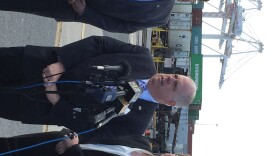In an era of sharp, partisan infighting, Maryland’s Democratic Senator Ben Cardin has helped craft a sweeping bipartisan bill that could go a long way to deal with Maryland’s water infrastructure issues. And proponents say it may be one of the few bills that can gt through Congress in this election year.
Cardin says the bill that’s aimed at revitalizing the nation’s ailing water infrastructure is key for Maryland because it offers a blue print for how the nation deals with clean water and ports.
Whether you own a small marina on the Eastern Shore or are dependent on commerce coming in through the Port of Baltimore, he says, "you're dependent on having the resources and planning and authorization to make sure the channels will be deep enough so that your tanker can get into Baltimore or that your charter can get into Salisbury."
And this bill will help that.
As the top Democrat on the Public Works Committee’s subcommittee on Transportation and Infrastructure, Cardin played a major role in crafting the bill and he says he’s optimistic the bill can actually pass, even in the midst of a heated election year.
"Oh, I think we have an excellent chance," he insisted. "It's got strong bipartisan support. It's in the range that's likely to get through. We'll get 60 votes easily. I think it's a good chance."
The legislation includes GOP goals, like stream lining projects, and Democrat’s goals, like increasing water and wastewater storage.
Striking a deal that makes urban and rural lawmakers from both parties happy doesn’t seem easy, but Delaware Senator Tom Carper, the ranking Democrat on the Environment and Public Works Committee, says it’s a little easier because the federal government actually plays a huge role in the nation’s water infrastructure.
"Ninety nine percent of the freight that moves in and out of our ports in America, ninety nine percent, comes through waterways that are maintained by the Army Corps of Engineers," he said. "Everybody has a dog in this fight. Everybody."
Still, Cardin and other Democrats are disappointed the bill wasn’t included in President Trump’s initial call for a more than $1 trillion infrastructure bill that’s now been shelved.
"I think the scope might not be as large as we would like it to be because we don't have more revenues," he said. So we have to keep it modest."
Congressman Dutch Ruppersberger, the Maryland Democrat whose district includes the Port of Baltimore, agrees and says Trump missed an opportunity when the infrastructure plan was shelved.
"Infrastructure's extremely important to our country," Ruppersberger said. "It creates jobs and it's bipartisan. If Trump were smart he would've started with that instead of all the other things that he's been trying to do that haven't worked."
Ruppersberger, who has been fighting the president’s calls to cut funding entirely for the Chesapeake Bay Program from his seat on the House Appropriations Committee, says the port bill recognizes a federal government role in infrastructure that Trump appears to ignore.
"And then he wants the state and locals to fund it," Ruppersberger complained. "There's no funding for that. We put it back in- an example. He zeroed out the Chesapeake Bay and, I'm an appropriator, we were able to get back $73 million. That type of thing, that's why we have the checks and balances."
Still, Ruppersberger says he’s glad a bipartisan group of lawmakers is taking the lead and that a water infrastructure bill is critical to Maryland’s economy both now and into the future.
"All the aspects of it just relating to the port of Baltimore," he said. "I mean we need dredging. We have to have bigger ships that come in and the port for the whole region is one of our top economic areas. It's thousands and thousands of jobs."
Although proponents say Cardin’s water infrastructure bill has a good chance of passing, there’s still no timeline for when it may hit the Senate floor.




